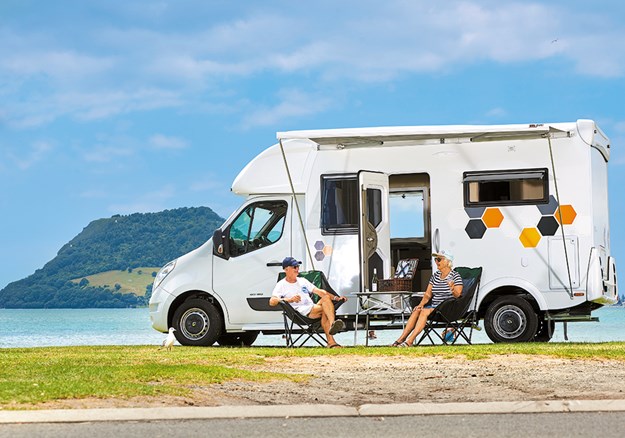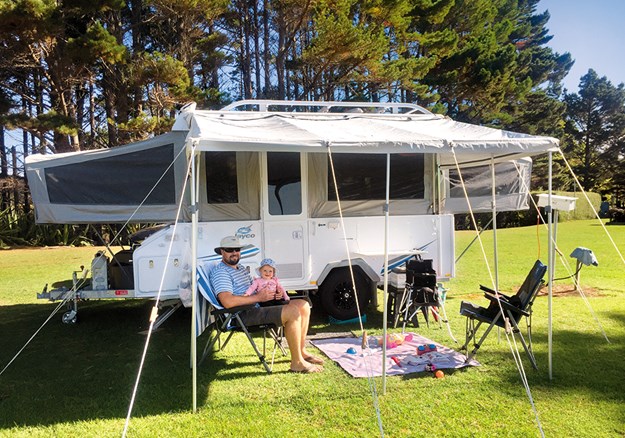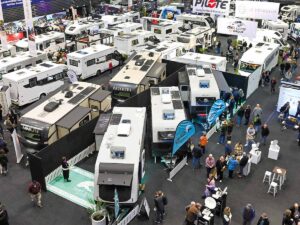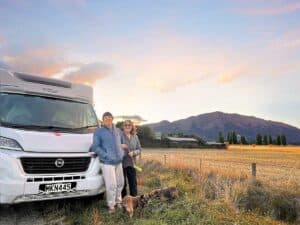
First up, it’s important to really understand your intentions behind your purchase and what kind of lifestyle you have in mind. For example, are you looking to travel during the weekends only or do you want to hit the road for weeks at a time? During your research you should be asking yourself a few key questions.
- What is your lifestyle dream?
- Will you mainly travel as an individual, couple, or family?
- Do you have a specific hobby you need to accommodate while you’re travelling?
- How important is it to you to have a sought-after brand and model, should you choose to sell it or upgrade?
- Where do you see yourself exploring, and at what time of the year?
- Will you stay in campsites or do you want to freedom camp?
- How long do you want to be away?
MOTORHOMES
A motorhome will suit those whose preference is for a combination vehicle and mobile home; the freedom camper; a person who values maximum manoeuvrability in campgrounds, and anyone who wants to set up camp with minimum fuss.
PROS
- Motorhomes are relatively quick and easy to park and set up
- You can be spontaneous and go from place to place quite easily
- With a bit of practice, most confident drivers will easily handle driving a motorhome
CONS
- Once you’re set up at a campsite, it can be a hassle to pack up and unhook your motorhome if you realise you need extra supplies and have to drive to get them
- Motorhomes are generally more expensive than caravans to purchase
- With cab space taking up room, there’s less ‘living’ space inside a motorhome than a caravan of the same length

CARAVANS
Caravans can go most places a motorhome can go; and they can also be used for freedom camping providing the driver is competent towing and at getting in and out of awkward places. You will of course need a suitable tow vehicle and set up time is usually a little longer than with a motorhome and less convenient when it’s raining. However, once camp is set up, the tow vehicle is free for travel without the need to unhook power and pack everything away.
PROS
- A caravan can double as extra accommodation for friends and family to stay in at home
- Caravans are generally less expensive than motorhomes
- You can set up at your campsite and still have a vehicle to go exploring or shopping
CONS
- You’ll need to factor in the additional cost of the tow vehicle and its maintenance
- You can’t be quite as spontaneous – it’s not as easy to pull over and take in a view or check out a shop when you’ve got to park with a caravan
- You’ll need to be confident at towing
TIPS TO HELP YOU MAKE THE RIGHT DECISION
- Network with other motorhomers and caravanners, but be sure to back up what you’re told with facts. If you don’t personally know anyone with an RV you could join a motorhoming Facebook group and get first-hand advice from someone who just went through the process. Many motorhomers in New Zealand have their own blogs and YouTube videos, so do a bit of searching online.
- Try before you buy. If possible, see if you can hire or borrow an RV similar to the one you’re thinking of purchasing, even for a small amount of time – preferably overnight – so you can get a real feel for how it will suit your needs.
WHAT NEXT?
Still not sure which RV is right for you? A good idea is to read a few reviews and stories about others who have been through the process (MCD magazine has lots online at nzmcd.co.nz). If you have an RV centre nearby, pop in for a chat about which vehicle might be best for the travel lifestyle you’re looking for. Most specialists have a wealth of experience and are only too happy to offer impartial opinions.
Find motorhomes, caravans and RVs for sale in NZ





